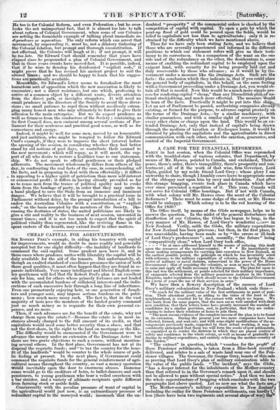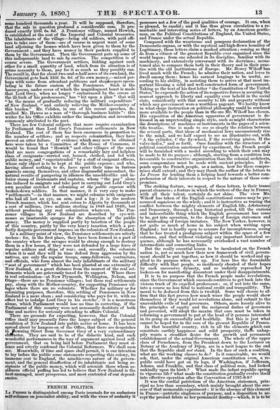A CASE FOR THE FINANCIAL REFORMERS.
P.Anr,v in last session, when the Colonial Office was reproached with the troubled state of various colonies, that Department, by means of Mr. Hawes, pointed to Canada, and exclaimed, There's peace, there's order, there's tranquillity, there's prosperity and con- tentment ; all of it the work of that wise, firm Governor, Lord Elgin, guided by my noble friend Lord Grey ; whose glory I am unworthy to share, though I humbly crave leave to appropriate some of the obloquy cast upon him by envy and detraction. Just after this strange bragging, events took place in Canada which have ever since prevented a repetition of it. This year, Canada will not serve for Colonial Office boastings. But if not with Canada, with what colony will Mr. Hawes cross the scent of the Colonial Reformers ? There must be some dodge of the sort, or Mr. Hawes would be unhappy. Which colony is to be the red herring of the Office for 1850 ?
The Office itself, by means of the Globe newspaper, helps us to answer the question. In the midst of the general disturbance and disaffection of our Colonies, the Globe has begun to brag, in the very manner of Mr. Hawes, of Lord Grey's wonderful ii in New Zealand. Verily, saith the Globe, the military expenditure for New Zealand has been grievous ; but then, in the first place, it was unavoidable, having been made so by " the errors or ill-luck of Lord Grey's Predecessors " • and, secondly, "the future" being " comparatively clear," when 'Lord Grey took office - - - - "he at once addressed himself to the means of reducing this draft upon the resources of the mother-country. • * • He immediate) y set about making arrangements for carrying into execution in New Zealand, at the earliest possible period, the principle on which he has invariably acted with reference to the military expenditure of colonies, not having the cha- racter of military or naval stations, subservient to the power of the Home Government ; that of requiring the colonists, as soon as may be, themselves to raise and apply all funds necessary for this purpose. The plan hit upon to this end was the settlement, at points selected for their military importance, of emigrants selected from the military pensioners resident m the United Kingdom, under regulations which should secure to the Colonial Government for a term of years the use of their services in arms." We have then a flowery description of the success of Lord Grey's military colonization in New Zealand ; which ends thus- " much for the military value of the first settlements in point of posi- tion. Their attendant profit, as adding to the value of the land in the neighbourhood, is vouched for by the extract with which we began. We also learn from the same papers, that the men are so well satisfied with their new condition, that their letters home have greatly increased the number of candidates for a similar provision, and, in particular, that they are endea- vouring to induce their relations at home to join them. "The most recent evidence of the complete success of the plan is to be found in its extension. During the prose* year two more companies have been collected, formed, and sent out ; and with some slight modifications of the ar- rangements previously made, suggested by their actual working, it may be confidently anticipated that these too will form the nuclei of new settlements, so organized as to render the districts in which they are placed centres of safety and confidence to the whole colony, as well as means of gradually re- ducing its military expenditure, and entirely relieving the mother-country of this burden."
" The extract" in question, which " vouches for the pro, of these Pensioner settlements, is taken from a Blue-book recently delivered, and relates to a sale of waste land near one of the Pen- sioner villages. The Governor, Sir George Grey, boasts of this sale as proving that Lord Grey's plan of military colonization adds to the value of the public lands. " The incident," says the Globe, "has a deeper interest for the inhabitants of the Mother-country than that referred to in the Governor's remark upon it, and should not be allowed to pass without special notice." And then we have the whole superstructure of bragging which concludes with the two paragraphs last abovenoted. Let us now see what the facts are.,The other-country's military expenditure in New Zealand; including the outlay for these Pensioner settlements, can hardly 1,t less (there have been two regiments and several ships of war) Ogg some hundred thousands a year. It will be supposed, therefore, that the sale in question produced a considerable sum. It pro- duced exactly 2531. 6s. 6d. A Pensioner village, named Howick, is established at the cost of the Imperial and Colonial treasuries. The inhabitants of the village—being old soldiers, with paid offi- cers to take care of them—are of course in urgent 'want of some land adjoining the houses which have been given to them by the Government ; and they have money in their pockets supplied to them by the Government. Then the Government puts up some of this indispensable land to sale by auction. The competition is of course severe. The Government settlers, bidding against each other for a small quantity of land, which from its situation is of prime necessity to them, pay for it as much as they possibly can. The result is, that for about two-and-a-half acres of its ownland, the Government gets back 2531. 68. 6d. of its own money,—mixed per- haps with some from attendant publicans and shopkeepers specu- lating in the future custom of the Pensioners. Such is the hocus-pocus, under cover of which the magniloquent boast is made that Lord Grey, when no longer " embarrassed by the errors or the fll-luck of his predecessors," has "hit upon a plan " that will " be the means of gradually ;educing the military expenditure " of New Zealand, " and entirely relieving the MOther-country of this burden." Mr. Cobden, in one of his recent speeches, de- scribed Mr. Hawes as a man of " thorough business habits" : this writer for his Office exhibits rather the imagination and invention commonly attributed to the poet. There are few Colonial subjects that more require examination by Parliament than Lord Grey's Pensioner settlements in New Zealand. The cost of them has been enormous in proportion to the number of settlers; and as respects colonization, they have proved an utter failure. If evidence which may now be obtained here were taken by a Committee of the House of Commons, it would be found that " Howick " and other villages of the same kind are mere congregations of a remarkably lazy and helpless class of emigrants—carried out, housed, clothed, and fed with public money, and " superintended " by a staff of emigrant officers, whose only object is to be kept at the public expense ; and who, having almost nothing to do, haves it their time in furious quarrels among themselves, and other ' misconduct, the natural results of pampering in idleness e unsoldierlike and in- ferior stamp of lieutenants and captains, whom "the pay" alone has induced to emigrate and take part in carrying out Lord Grey's own peculiar crotchet of colonizing at the .public expertise with broken-down soldiers. In that manner, it is very easy to make '' settlements "—in that manner, we might colonize with emigrants who had all lost an eye, an arm, and a leg : it is the modern French manner, which flits sent colons to Algeria by thousands at a cost of millions, (two millions sterling in 1848 and 1849), but without producing any real colonization whatever. The Pen- sioner villages in New Zealand are described by eye-wit- nesses as insaturable sponges for the absorption of the public money. The money is supplied partly by taxation of the people of this country, partly by the very heavy taxation which a per- fectly despotic government imposes on the colonists of New Zealand. In a military point of view, the Pensioner settlements are utterly, useless : for, in the first place, they have been formed in a part of the country where the savages would be strong enough to destroy, them in a few hours, if they were not defended by a large force of regular soldiers and ships of war ; and, secondly, the colonists whom it is said they will in time defend from aggression by the natives, are only the regular troops, camp-followers, contractors, and officials, who form almost the only inhabitants of the military "seat of government" which has been planted at one extremity of New Zealand, at a great distance from the nearest of the real set- tlements which are grievously taxed for its support. Where there is real colonization—at New Plymouth, Wellington, Nelson, and Otago—there are no Pensioner villages ; but those real settlements ri:along with the Mother-country, for supporting Pensioner vil- e where there are no colonists. Whether for military or for co colonizing purposes, therefore, this settling of Pensioners in New Zealand is a mere sham ; and considering who pays for it, with no effect but to indulge Lord Grey in his crotehe'; it is a monstrous abuse, which Parliament would lose no time in correcting, if the Parliament of this country were not necessarily destitute of both time and motive for seriously attending to affairs Colonial. There are grounds for expecting, however, that the Colonial Office itself may presently force the larger subject of the general condition of New Zealand into public notice at home. It has been spread about by hangers-on of the Office, that there are despatches in lowning Street from Governor Grey of a very extraordinary chWacter. They are said to be of the didactic kind, and such wonderful performances in the way of argument against local self- government, that on being laid before Parliament they must si- lence and utterly confound the Colonial Reformers. We shall soon see. Meanwhile, if time and space shall permit, it is our intention to lay before the public some statements respecting this colony, its immense cost to England, the mischievous nature of its govern- ment, and the general disaffection of its inhabitants not being re- cipients of the public money, which will astonish those whom as- siduous official puffing has led to believe that New Zealand is the best-managed, most prosperous, and most contented of our depend- encies.































 Previous page
Previous page